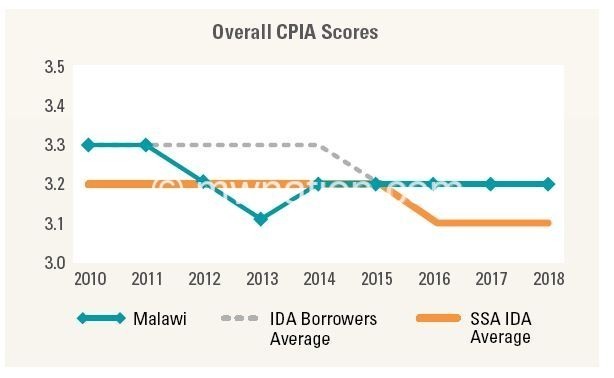Growth, poverty reduction stalls
Malawi made no progress on improving the frameworks necessary to promote poverty reduction and sustainable growth in 2018, the World Bank has established.
The Washington-based development bank found in its annual 2018 Country Policy and Institutional Assessment (CPIA) that the score remained unchanged from 2017 at 3.2, just slightly above the 3.1 Sub-Saharan region average.

CPIA scores assess how likely a country’s policy and institutional frameworks are to reduce poverty and sustainable growth. They consist of 16 criteria in four areas—economic management, structural policies, policies for social inclusion and equity and public sector management and institutions—on which countries are assessed.
This year’s report, which also focused on the countries’ debt management capacity, saw Malawi 2.8 on economic management with fiscal and debt policy falling at 2 and 3, respectively, while monetary and exchange rate policy, at 3.5 was above the region’s 3.4 average.
The country, however, scored well on structural policies (3.2), policies for social inclusion and equity (3.6) and public sector management (3.2) against regional’s average score of 3.2, 3.3 and 3, respectively.
For the 38 countries assessed—ones that qualify for financial assistance from the International Development Association (IDA), a funding arm of the bank—the average CPIA remained unchanged from 2017 at 3.1 on a scale from 0 to 6.
This year’s report also focused on the countries’ debt management, because the median government debt reached 54.9 percent of gross domestic product (GDP)—an 18.5 percentage point increase in five years.
The World Bank said there were improvements in ‘some areas of social policy’ but that ‘macroeconomic management weakened’.
Senior economist and lead author of the report Gerard Kambou said: “Improvements in social inclusion and service delivery have historically been crucial elements of countries’ transitions out of fragility, so even modest steps count.
“African countries, fragile and non-fragile, need to keep the focus on gender, education, health, climate, and governance issues alongside macroeconomic management if they want to see true and lasting progress.”
As well as calling for the strengthening of debt management systems, the report also recommended reforming business regulations, which the bank hoped would lead to a stronger private sector and improved access to electricity. It also suggested “sustained efforts” to improve domestic revenue mobilisation.
This comes on the back of figures showing public debt at $4.3 billion (K3.2 trillion) or 68 percent of gross domestic product (GDP) with domestic debt at $2.2 billion (K1.6 trillion) or 34.9 percent of GDP and external debt at $2.1 billion (K1.5 trillion) or 33 percent of GDP.
The figures are above the internationally accepted threshold of 20 percent of GDP for domestic debt and 30 percent of GDP for external debt.
Last month, Reserve Bank of Malawi (RBM) Governor Dalitso Kabambe advised Treasury to rein in on both domestic and external borrowing, warning that there is insufficient room for further borrowing.





